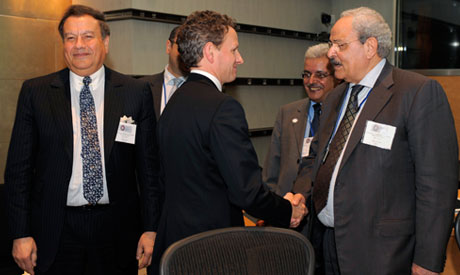 Egyptian finance officials are joining their global counterparts in Washington this week as they gather for the spring meetings of the International Monetary Fund and World Bank.
Egyptian finance officials are joining their global counterparts in Washington this week as they gather for the spring meetings of the International Monetary Fund and World Bank.
In an atypical move, the Egyptian delegation is being led on Wednesday by Minister of Communications and Information Technology, Mohamed Salem, with the interim Minister of Finance, Momtaz El-Saeed, arriving a day later. Egypt's controversial planning minister, Faiza Abul-Naga, will not be in attendance.
The meetings come at a crucial time for the economically-battered country. Last week, El-Saeed said Egypt will seal a $3.2 billion loan with the IMF by 15 May, before the election of its first post-Mubarak president.
The IMF's verdict on the global economy will be released on Tuesday. This will be followed by the meeting of the Group of 7 rich nations on Thursday and that of G20 finance ministers and central bankers on Friday. The IMF and World Bank's Spring Meetings will be held on 20 to 22 April.
The governor of Egypt's central bank typically attends season IMF meetings but it is not clear from media reports whether Farouk El-Okda has also travelled to the US.
The absence in Washington of Faiza Abul-Naga, Egypt's Minister of Planning and International Co-operation, has prompted local speculation that American authorities have denied her entry to the country -- claims rejected by Egyptian finance officials.
Earlier in 2012, Abul-Naga was the driving force behind the indictment of 16 Americans working for non-licenced NGOs in a case that put relations between the US and Egyptian governments under their biggest strain in three decades.
Abul-Naga also accused the US of pouring money into federally financed non-profit groups that promote political activism, saying they were working to thwart Egypt's uprising and protect US and Israeli interests.
Speaking to the state-run Al-Ahram newspaper on Sunday, a member of the delegation denied Abul-Naga's absence from Washington was linked to the disagreement.
"The minister has a valid visa to enter the US but other commitments have prevented her participation," the member said, adding that Abul-Naga was scheduled to travel to Marrakech, Morocco, to participate in a regional meeting of Arab financial institutions over the same period.
The IMF is seeking up to $600 billion from its members. But its funding request appears to be getting whittled down in size and swept into a bigger battle by emerging economies demanding greater voting power at the IMF, commensurate with their growing economic clout.
Their case gains potency as the World Bank, the IMF's sister organization, looks poised to reject a Nigerian candidate to as its new head.
The directors of the World Bank are meeting on Monday to decide who will be the powerful institution's next chief. All expectations are that the US will maintain its unbroken lock on the position.
While the US nominee has faced a challenge for the first time in 66 years, from two solid developing country candidates, there was little doubt that the Bank's most powerful shareholders -- the United States, Europe and Japan -- would support Korean-American physician Jim Yong Kim.
After one of the two challengers, former Colombian finance minister Jose Antonio Ocampo, dropped out Friday complaining that the selection process was all political, it left Nigeria's current finance minister Ngozi Okonjo-Iweala, Kim's only challenger.
There were some hopes from critics of the Bank that the powerful emerging BRICS economies -- Brazil, Russia, India, and China -- might coalesce around Okonjo-Iweala, a two-decade veteran of the bank.
These were scotched on Friday, however, when Moscow publicly endorsed Kim.



